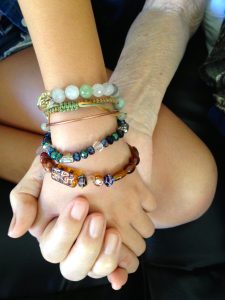AARP Hearing Center

I imagine my mother’s diseased brain like a dusty movie projector. It seems most of the time the projector is motionless while she’s passively absorbing her environment, but when spoken to, she can occasionally command the projector to play a short scene.
When I visit with her, after catching her up on the latest news, I talk about old times. I dig into the archives from 20 years ago, because those are the movie reels that haven’t been fully destroyed. So yes, there is a strong component of the past in our visits.
More prominently, though, I’ve come to realize there is an even larger element of the present in our interactions. It is all happening in the here and now. What happened two minutes ago will be promptly forgotten.
We were having a good time one Sunday. Olivia and I were entertaining her with stories and she seemed to enjoy our chatter and presence.
It brought her some vitality. She even reacted appropriately to the anecdotes, laughing at all the right parts.
She won’t remember this after we leave, I thought sadly. That’s too bad.
Her mind will revert a blank screen. There is no past, no future in there. It’s just the present.
Then I realized it’s a Buddhist and a yogic lesson on living in the now: She enjoyed our 45-minute visit, which seems to be her limit before getting tired.
We made her happy this morning. We gave her joy, but in the absence of that, we do not give her sadness.
She has no suffering because she lives in the moment. She has no expectation of the future, no attachment to the past. It is I who suffers with my expectations and attachments.
When I see her next week, I will bring her the gift of laughter, and I will try to let that be enough for me. I will try to do a better job of living in the present.
Former television news anchor Diane Ako writes about her life as a mother, wife and caregiver in her "Peace of Mind" blog.































































